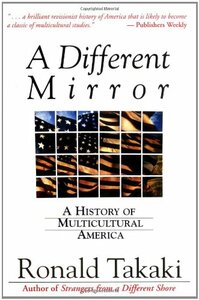Take a photo of a barcode or cover
challenging
dark
emotional
fast-paced
challenging
informative
reflective
medium-paced
Finally finished! The first half was a little slow but filled with important information so I took my time getting through it. The second half was incredible. Read it at a lightning pace. Such an important book!!!
Had to read this for a class and I found it really informative, and information dense as books like this can be, but very enlightening.
This was a REALLY good book. It goes into extensive detail about minorities in America. Doesn't really put "whites" in the best of light, nor does it detail religious minorities/discrimination as much as racial/ethnic groups. Very educational.
This is clearly way overdue, but I just completed A Different Mirror and absolutely loved it! The book is timeless. No matter what decade we are in or what the domestic situation in the US looks like, there will always be people of color and there will always be a struggle to belong.
I myself am an immigrant out of Bosnia and married a white American woman. We didn't face the struggles that others do, but it's a sobering thought and Dr. Takaki's book really makes you look at this country and hope for a better future where everyone has a voice
I myself am an immigrant out of Bosnia and married a white American woman. We didn't face the struggles that others do, but it's a sobering thought and Dr. Takaki's book really makes you look at this country and hope for a better future where everyone has a voice
I read this book for a class in grad school quite a few years ago, but the stories and perspectives Takaki offers still invade my mind from time to time. In the realm of multiculturalism, it can be easy for forums to quickly turn to derision and insults when one feels threatened. Here, Takaki speaks in a very objective voice that seems to be merely stating facts. It seems he felt confident that the facts would speak for themselves and needed no extra overtones, and that was what I appreciate most about his writing.
In the end, he states his goal the best: "I believe our education system as a whole has not integrated the histories of all people into our education system, just the Eurocentric view of itself, and the White-centered view of African Americans, and even this is slim to nonexistent. What I find is that most people don't know the fact they don't know, because of the complete lack of information." It seems his main hope is to give us more information on the many facets of our very diverse nation.
In the end, he states his goal the best: "I believe our education system as a whole has not integrated the histories of all people into our education system, just the Eurocentric view of itself, and the White-centered view of African Americans, and even this is slim to nonexistent. What I find is that most people don't know the fact they don't know, because of the complete lack of information." It seems his main hope is to give us more information on the many facets of our very diverse nation.
challenging
informative
slow-paced
This is a brief (just over 300 pages) overview of different non-Anglo groups in America, from their own perspective and often in their own words. I think the end, when he gets into the 1980s and beyond, is the weakest part. I read the original 1993 edition, and I hear there's a 2008 edition. I may have to check it out to see if some of the flaws toward the end of the book were honed in the later edition. Overall, though, it was a good read - one that made me want to follow up on several topics and people I learned about in the book.


